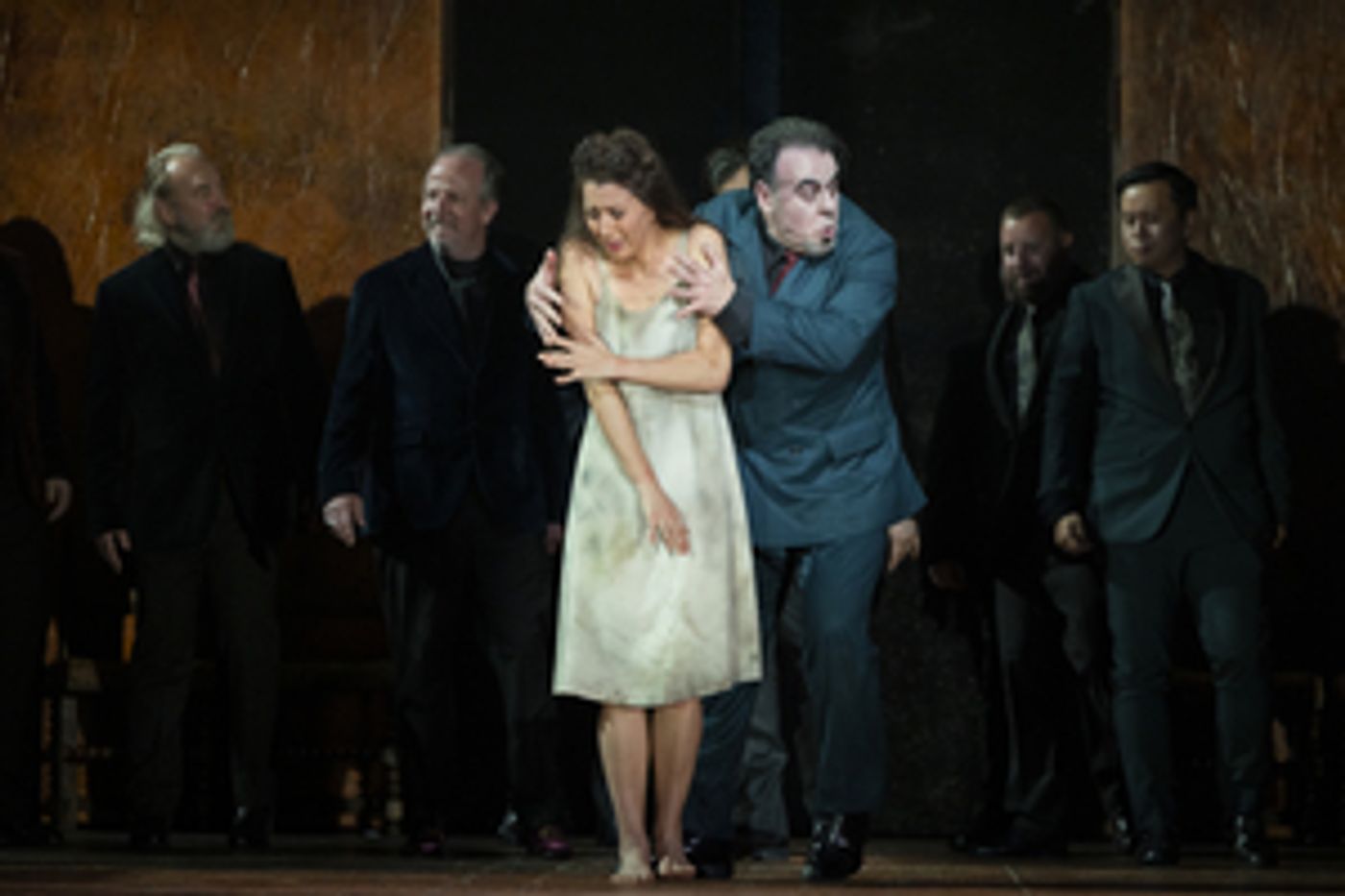Review: RIGOLETTO, Royal Opera House
A brilliant new production underlines just how relevant the opera is in today's world

![]() Rigoletto is the court jester, the Duke of Mantua's personal insult comic, the hunchback who specialises in getting other people's backs up. The courtiers, a sharp suited and spivvy male chorus, discover that he's keeping a lover and hatch a plan to kidnap her to exact a measure of revenge. But it's no lover, it's Rigoletto's daughter, Gilda, whom he confines to her room and church services in order to protect her from the libidinous Duke's licentious ways. But he caught her eye one Sunday, seduces her anyway and she faces a choice when her father plots with an assassin to see off his womanising master.
Rigoletto is the court jester, the Duke of Mantua's personal insult comic, the hunchback who specialises in getting other people's backs up. The courtiers, a sharp suited and spivvy male chorus, discover that he's keeping a lover and hatch a plan to kidnap her to exact a measure of revenge. But it's no lover, it's Rigoletto's daughter, Gilda, whom he confines to her room and church services in order to protect her from the libidinous Duke's licentious ways. But he caught her eye one Sunday, seduces her anyway and she faces a choice when her father plots with an assassin to see off his womanising master.
If that sounds like we're swimming in some deep, dark waters, we are, but this new production, the house directorial debut of Director of Opera, Oliver Mears, leavens the fare with wit and blackest humour and sets comprising gigantic versions of the paintings with which the Duke distracted himself in those rare moments when he did not have a actual live nude woman to contemplate. Sure it's tragic and it asks serious questions about hot button topics such as disability, parental responsibility and mental health, but it's not relentless, not another example of the misery porn that so pervades all forms of culture at the moment.
Carlos Álvarez vests his Rigoletto with a cynical weariness at his fate, his deformity (as it did until frightening recently) condemning him to be a combination of amusement and lucky charm. Naturally, he does it well, but there's no joy, Álvarez's baritone plaintive rather than strident, his grins crooked rather than gleaming. We see him sheath his weapon (that sharp tongue) with his daughter, the dazzling Lisette Oropesa, who is so naive, so in thrall to the Duke's well-practised if clichéd chat, so willing to risk all, hothouse flower shorn of the strength to stand in the outside world.
Oropesa gets to the heart of Gilda's tragedy - that in protecting her, her father left her open to the first man to pay her any attention. Should he have trusted his intelligent and beautiful daughter to swim with the sharks in the palace? The time had to come, but "Tomorrow" is often the easiest answer for any parent when a child must be sent out into a hostile and risky world. Oropesa's huge reception at the curtain underlined how emotional was her connection to the audience and how magnificently she sang the role.
Liparit Avetisyan is a swaggering Duke, leaving a trail of 'Me Too' victims behind him, exercising his power both ruthlessly to bed the wives of his subjects and to quell, through direct and bloody violence, anyone brave enough to call him out. This is alpha male egoism writ large, with parallels to today's political, business and entertainment leaders all too obvious. He even gets a good tune or too (tenors' favourite "La donna è mobile" is very bleak in the circumstances) and, though he's monstrous, he's not necessarily a monster - there's just too many women who would disagree with that label.
There's excellent support work from Brindley Sherratt's amoral assassin, Sparafucile who imprisons his sister, Maddalena (Ramona Zaharia) as Rigoletto held his daughter, but only as a lure for his victims. Eric Greene retains Count Monterone's dignity, even as he loses his eyes, the only man to challenge the Duke, made an example pour encourager les autres. That righteousness powers the curse that eats away at Rigoletto, another example that the jester knows he does harm, knows that there is a line between good and evil and that he's too often been on its wrong side.
Antonio Pappano was roared to the platform, recognising the trauma all the musicians, singers, administrators and everyone involved at this great house had gone through during Covid times and he and his orchestra repaid that respect, nay, love, giving full value to Verdi's masterpiece. This is an opera is so embedded in psychology that it effortlessly stretches across nearly 200 years to hit us both with its insight into the human condition and its blending of music and voices that say as much about love, responsibility and tragedy as any of the words we see scrolling over the stage.
Rigoletto continues at the Royal Opera House until 12 March
Photo Ellie Kurtz
Reader Reviews

Videos

